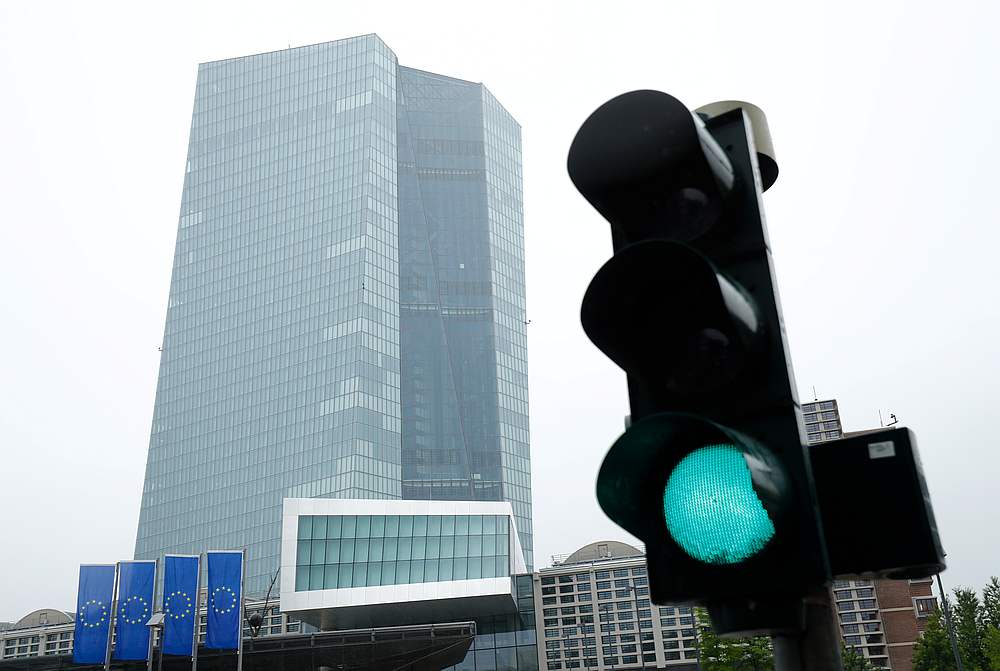FRANKFURT, Oct 29 — The European Central Bank pledged today to bolster its pandemic stimulus in December as surging coronavirus infections darken the eurozone’s economic outlook.
The recovery is “losing momentum more rapidly than expected” after the partial rebound seen in the summer, ECB president Christine Lagarde said after a virtual meeting of the 25-member governing council.
With risks “clearly tilted to the downside”, she said ECB governors will use next month’s updated growth and inflation forecasts to “recalibrate our instruments” to keep credit flowing in the 19-nation currency club.
“We agreed all of us that it was necessary to take action,” Lagarde told reporters in Frankfurt.
The promise of more monetary easing comes a day after France and Germany joined Italy and Spain in introducing new shutdowns to halt a second Covid-19 wave, set to inflict more economic pain.
The first wave of cases in March prompted the ECB to roll out a €1.35 trillion (RM6.5 trillion) bond-buying scheme to keep borrowing costs low and boost the economy.
Many observers expect the scheme to be beefed up at the December 10 monetary policy meeting.
Lagarde however stressed that the ECB had more than just PEPP up its sleeve, and would look at “all the instruments that we have with the entire flexibility that we have” for its next moves.
“We have responded very promptly, very appropriately” she said. “We have done it for the first wave, we’ll do it again for the second wave.”
Early action?
As expected, ECB governors kept interest rates at historic lows and maintained their ultra-cheap loans to banks today.
They also left unchanged their pre-pandemic asset-purchasing scheme to the tune of €20 billion a month, although some analysts expect the pace of the purchases could be increased before the end of the year.
Andrew Kenningham, an economist at Capital Economics, said the ECB might pull the trigger earlier than expected.
“With the region’s two biggest economies about to enter fresh national lockdowns, and others likely to follow suit, we would not rule out the possibility that the bank moves even before then,” he said.
Lagarde herself said: “We’re not going to just stand still.”
Lagarde also reiterated her plea for eurozone governments to share the load with fiscal efforts.
She has welcomed the European Union’s €750 billion coronavirus recovery package agreed in principle in July, and called for it “to become operational without delay”.
Deflation fears
The ECB’s unprecedented monetary stimulus is aimed at bolstering economic growth and driving up stubbornly low inflation to its goal of “below, but close to two per cent”.
Eurozone inflation, however, stood at -0.3 per cent in September after dropping into negative territory in August, raising the dreaded spectre of deflation in the 19-nation currency club.
Deflation, or a spiral of falling prices, is a worry for policymakers because it can deter customers from spending in anticipation of even cheaper prices, creating pressure on businesses which may end up cutting jobs or closing down.
Inflation in Germany, Europe’s top economy, today came in at -0.2 per cent for October, the same rate as in September, dragged down by lower energy prices and a temporary sales tax cut.
Based on its September forecasts, the ECB expects eurozone inflation to inch up to 1.3 per cent by 2022, still far off the official target.
The eurozone economy was expected to shrink by eight per cent this year before rebounding to see five per cent growth in 2021.
However, most analysts agree that the latest setbacks in the fight against the virus mean those forecasts are now outdated, with the final months of 2020 likely to be worse than expected.
The eurozone’s third quarter gross domestic product (GDP) figure is due to be released tomorrow, and “might surprise on the upside”, Lagarde said.
“On the other hand, we are pretty confident that our number for the fourth quarter will be on the downside”, she added. — AFP






















